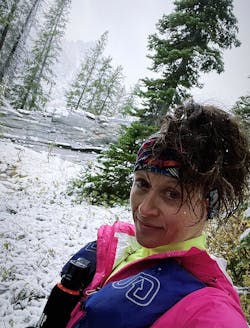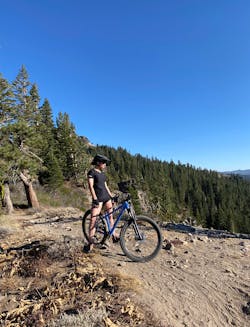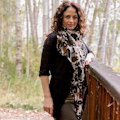The saying ignorance is bliss is the first thing that comes to my mind. The second is that right here and now, I’m going to give a disclaimer: I will not apologize for my experience with COVID-19. Why? Because the pendulum of opinions with this virus is all over the place. As history will prove, if medical providers say they have (or had) COVID-19, they are shunned, shamed, questioned about their judgment and ability to be safe, and many will speculate as to whether the seriousness of the pandemic was taken to heart. You know exactly what I’m talking about, and yes, we’re going to talk about the elephant in the room.
First of all, I really truly don’t know when I got COVID-19. I have an idea, but let’s be honest—at this stage in the game, that doesn’t mean anything. A weekend back in October, when Old Man Winter stakes his claim in Montana, I took off and climbed a mountain. It’s what I do. It was raining when I started and by the time I got to the summit and lake, it was freezing and snowing. I was in shorts. I was in my element. I was happy.
That aforementioned scenario lasted for a week; I was down for two days because of sinus pressure.
Did I have COVID-19 then? No clue. But what I do know is I wasn’t going to “sheep it” and get a test for sinus pressure because guess what? I got better and resumed my day-to-day life. People get sick for reasons OTHER than COVID-19. Let me repeat that—people get sick for reasons other than COVID-19. Aside from that one incident, I’ve felt fine and haven’t skipped a beat since.
How do I know I had it? For the heck of it, I went and got antibody tests done. Those vials of deep red blood contained high titers of COVID-19 antibody warriors. Done and done.
If you google “COVID-19 recovery rate,” you get over two billion hits. Who’s right? Who’s wrong? Who do you believe? Am I getting into territory that makes you uncomfortable? For many, yes. The news and media are huge stressors, because fact gets injected with rhetoric and opinion, which subsequently makes it difficult to understand the true nature of the beast. I believe that with our medical backgrounds, we have the ability to filter through the onslaught of information that the general population can’t. As such, it is our responsibility to educate and treat those patients who have been affected directly and indirectly by this pandemic. What do I mean by this? Keep reading…
Just two days ago, I had three patients come in with cracked teeth who reported higher-than-normal anxiety and stress. Two others had higher-than-usual blood pressure (when compared to previous visits), and they also reported high stress and anxiety. Quite frankly, one woman was a mess. Stress had caused her to clench and grind to the point that she cracked a virgin molar and has such severe TMJ issues that it was affecting simple everyday things like eating and talking. I sat this patient up, looked her in the eye, and said bluntly, “You need to reset, calm down, eliminate stressors, and start taking care of you. Everything. Will. Be. OK.”
The common denominator with all of these patients: COVID-19.
As oral health-care providers, we are seeing and treating a number of these stressed patients who are cracking their teeth right and left, presenting with TMJ difficulties, oral herpes/canker sores, dry mouth due to anxiety medications, as well as oral flora being altered, leaving patients with thrush and an entire host of dental-related issues that need our attention.
Am I sounding like a broken record? Is the cure worse than the disease? Now there’s hot topic for debate.
Being cautious doesn’t mean that we need to sacrifice our mental and general overall health and well-being. Want more proof? Again, keep reading.
- “If I get my tooth pulled, will having a hole in my mouth increase my chances of getting COVID-19?”
- “Is taking blood pressure a ‘new COVID-19 thing’?”
- And, lest we forget, the lady who asked me if I could cut a hole in her mask to do her restorative work because she didn’t feel safe without it on.
Yes, that’s what we’re dealing with. And no, you can’t make this stuff up.
Let’s raise this question: Would you be willing to admit to your patients that you had COVID-19? Would you be willing to have a discussion with patients who are severely stressed and ensure them that their self-wellness is a priority right now? I’ll tell you what, those patients need our assurance and emphasis that taking care of their physical and mental well-being should be their number one priority. This includes eating healthy, exercising, reading good books, eliminating things that feed into those stressors (news, social media), finding a productive hobby, etc.
This isn’t dental talk per se, but since the oral cavity is attached to a body, a person, a human being…guess what? It’s part of the talk we need to walk and have with these patients, because we treat the ramifications of this stress.
So yes, I had COVID-19. Yes, I talk about it. Yes, I assure people things can and will be OK. I also assure them that mitigating risk factors in all areas of their wellness is beneficial.
If you feel as if my personal experience is somewhat callous or demeans those who are on the front lines or those who have lost loved ones, you couldn’t be further from the truth. Why? Because it’s OK to have COVID-19 and not have a bad experience with it. Or in my case, no experience at all. It’s OK to be supportive, reassuring, and educate without rhetoric and be the pragmatic rock that so many people need right now. It’s OK to step outside the boundaries of a “handpiece in the mouth” and reassure our patients that everything will indeed be OK and that this will all iron out. COVID-19 is not the end; rather, it’s just a turn in the road.
I’m interested in your happenings and stories you’ve had with COVID-19, directly and indirectly. Shoot me an email, and let’s chat.
All photos courtesy of the author.
Editor’s note: This article first appeared in Through the Loupes newsletter, a publication of the Endeavor Business Media Dental Group. Read more articles at this link and subscribe here.
Stacey L. Gividen, DDS, a graduate of Marquette University School of Dentistry, is in private practice in Hamilton, Montana. She is a guest lecturer at the University of Montana in the anatomy and physiology department. Dr. Gividen is the editorial codirector of Through the Loupes and a contributing author for DentistryIQ, Perio-Implant Advisory, and Dental Economics. She serves on the Dental Economics editorial advisory board. You may contact her at [email protected].
About the Author
Stacey L. Gividen, DDS
Stacey L. Gividen, DDS, a graduate of Marquette University School of Dentistry, is in private practice in Montana. She is a guest lecturer at the University of Montana in the Anatomy and Physiology Department. Dr. Gividen has contributed to DentistryIQ, Perio-Implant Advisory, and Dental Economics. You may contact her at [email protected].



